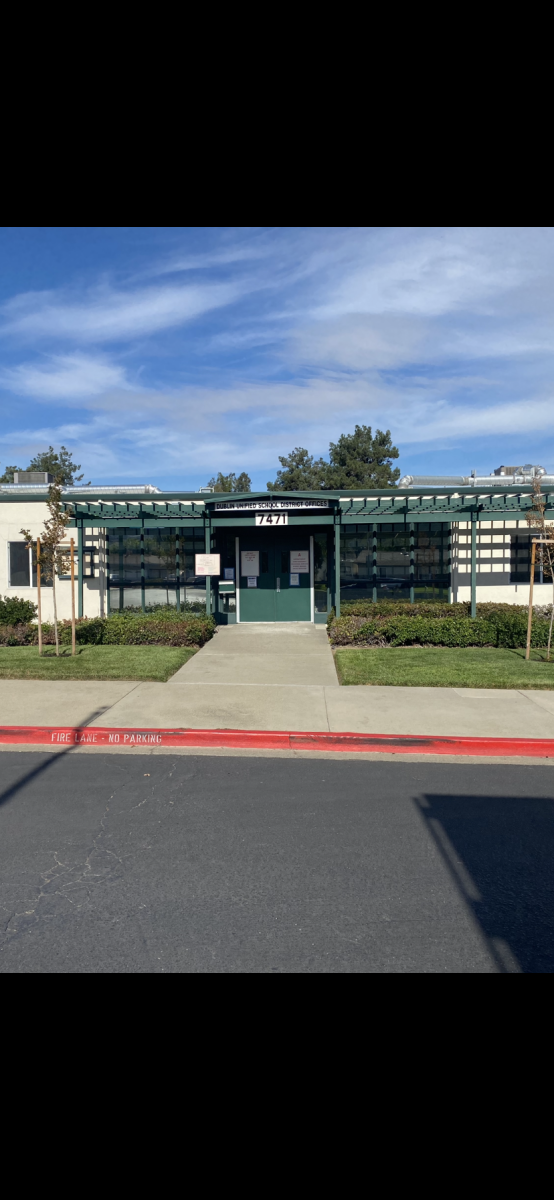On October 10, 2023, the Dublin Unified School District Board made significant revisions to Board Policy 5137, Positive School Climate. Unrevised since October 23, 2012, the policy was seemingly infused with a greater sense of inclusivity and value for student voices and opinions—a change from the policy’s original form which emphasized school order and harmony at the expense of student contribution. Notably, the Board added language about fostering an “inclusive” learning environment where students can feel “safe” and “experience a sense of belonging,” language that wasn’t present in the policy’s initial form. The new revisions establish, too, that classroom management techniques will now be “developed collaboratively with input from students”; that the DUSD superintendent “shall work collaboratively with students” on school programs like beautification, development of school-affiliated extracurriculars, and more to strengthen their “sense of belonging”; and, most strikingly, that students are now to “co-develop, evaluate, [and] revise… school policies and practices” and share in the district’s efforts in “problem-solving.” While not yet in effect, these revisions are “anticipated to be brought to the next board meeting,” on Tuesday, October 24, “for a second reading and approval.”
The district’s work for a more inclusive, student-centered environment follows its recent push for “equity grading”—a campaign that similarly moved to be more inclusive for students. Quite strikingly, the language in the new Board policy’s revisions strongly echoes that used in Dublin Unified’s push for equity grading. Specifically, the proposed new language emphasizes “research based” teaching methods, “bias reduction,” and “work[ing] collaboratively with students”—all rhetoric and principles of equitable grading. Importantly, this shows that, while equity-based grading was abandoned by the board in a July 18 special board meeting, the influence of its principles has persisted.
Equity-based grading is, at its core, a grading system that aims to evaluate student ability over student effort. Accordingly, homework, classwork, projects, and other work is de-emphasized, stripped of its points and grade weight, while assessments—tests and quizzes—are given disproportionate if not complete weight in the determination of a student’s grade. More significantly in the system, however, the traditional A-F grading system is heavily modified: instead of being assessed with A-F grades on tests and assignments of varying scores, students can expect to receive a 0-4 on each of their assessments, with a 0 corresponding to a 50%, a 1 a 65%, a 2 a 75%, a 3 an 85%, and a 4 a
95%. The reasoning behind the system is that students’ unique home conditions may disable them from completing homework regularly, unfairly advantaging those with stable home conditions who can earn points this way, and that, overall, assessing only students’ performance on assessments enables teachers to assess their students on the even, bias-free playing field of sheer demonstration of ability.
The system of equity-based grading itself has been a significant source of controversy. Proponents have embraced the system’s declared values of equity and inclusion for all, emphasizing the virtues of the system in creating a space where all students can succeed regardless of circumstances. For this reason, in light of the influence that the principles of equity-based grading have had over the new revisions, proponents celebrate the board’s new approach to the policy.
“I think, as a school, we need to represent the entire student body. And that includes those students who don’t live in the best circumstances,” an anonymous Dublin High Junior argues. “I also don’t think it’s productive to base grades on the amount of work you do: grades should reflect our understanding of the curriculum, not our work ethic.”
Opponents of equity-based grading, on the other hand, have argued that, while the system’s aims of inclusion and equity are noble, the system itself is an immense source of disadvantage and unfairness to students. They reason that, in essence, high school prepares us for college, and so should foster the values of hard work and consistency we will need in college. However, most important to detractors, they argue that Dublin Unified’s initial approach to implementing the program was problematic because it failed to include students’ and the community’s opinion on the system—a central irony to a system aimed at representing student voices. As a result, opponents have reservations about the language in the board’s new revisions.
“I was never given a survey or anything like that,” another anonymous Junior laments. “I didn’t even know it was still being used… considering [that] fact… says enough to the fact that they aren’t asking for student opinions.”
Adding onto this observation, a third junior echoes this opinion when asked about whether student and community voices were represented in the decision.
“Absolutely not. The students didn’t want it, the parents didn’t want it, and the administrators tried to [implement] it anyways.”
Despite their criticism of Dublin Unified’s past approach to implementation, both opponents of the system identify solutions to the problem.
“I think just, like, more effort to spread the word when big stuff is happening… because then students can actually have the chance to formulate an opinion to decide if [a policy] is good or bad before it’s actually implemented,” the second Junior chimes in.
“Mandated surveys and votes by the students—those are the best ways to represent a student’s opinions,” the third junior adds.
The new revisions may offer an opportunity to satisfy both sides of the argument. As new language is added to both create a more inclusive learning environment and to more explicitly require student involvement in policy decisions, both proponents and opponents alike may identify with the language in the policy.
In order to see whether or not the revisions of the policy are adopted, you can attend the meeting on Tuesday, October 24 in the District Office Boardroom at 7471 Larkdale Avenue, Dublin or livestream the meeting here. Alternatively, you can access the archived meeting stream here, or watch the meeting air via Channel 28 the following Thursday at 7:00 p.m., Sunday at 6:00 p.m., or Wednesday at 6:00 a.m.




































